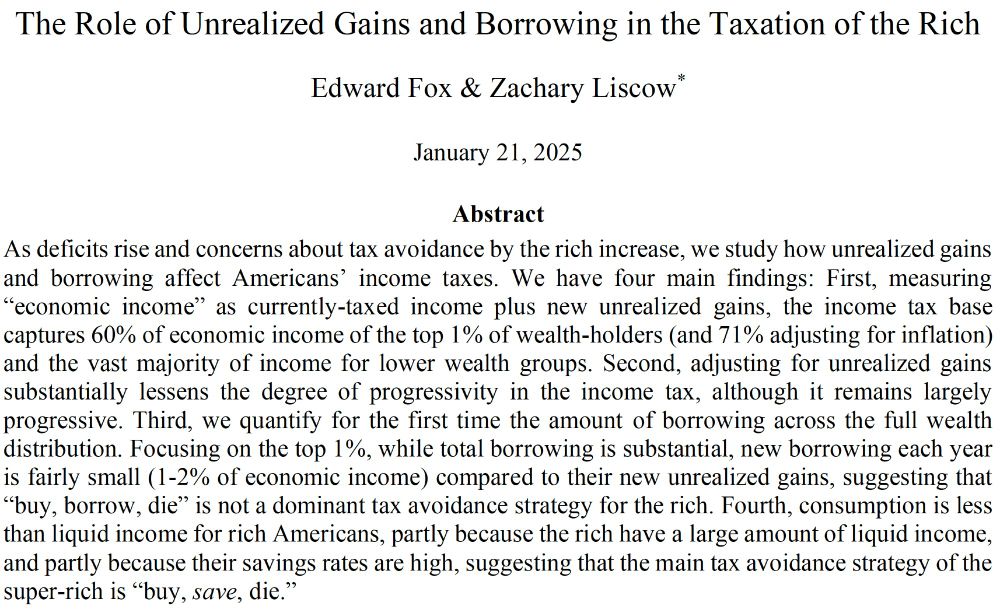Filled with so much pride today because Mari wrote this wonderful story for The Atlantic! It's (almost) enough to make me put my running shoes back on.
06.11.2025 22:14 — 👍 1 🔁 0 💬 0 📌 0
Going to break the "favorite" requirement and give two.
1. Science, Literature, and Ethics. Just enough ethics to get me thinking (and reading) throughout undergrad and law school. Plus, I was able to re-read some great novels.
2. International Ballroom Dance.
29.07.2025 15:48 — 👍 0 🔁 0 💬 0 📌 0

Everyone Is Using A.I. for Everything. Is That Bad?
i just find this so bizarre. searching through texts and doing the reading for myself is how i actually think through ideas! trying to put together a sentence is how i figure out what i actually want to say!
18.06.2025 00:55 — 👍 15514 🔁 1573 💬 706 📌 353
All Steven Soderbergh does is crank out excellent movies, and it honestly seems unfair and underappreciated
16.06.2025 14:40 — 👍 69 🔁 9 💬 7 📌 0
Enjoy!! Happy to provide recs (based on my 10 months of living here) if desired.
16.06.2025 15:29 — 👍 1 🔁 0 💬 1 📌 0

Sotheby’s Landmark Old Masters Sale Disappoints, Yielding Just $64.7 M.
A landmark Sotheby's sale of Old Masters works from the Saunders collection failed to even reach its low estimate.
I reported on a notable single-owner sale of Old Masters paintings that fell sort of high expectations, the multiple factors behind the low sell-through rate, and why certain works still set artist records: www.artnews.com/art-news/mar...
23.05.2025 20:43 — 👍 26 🔁 7 💬 2 📌 0
Absolutely surreal to get a “highly recommended” from @lsolum.bsky.social! For a devoted follower of the Legal Theory Blog like me, this falls somewhere between winning an Oscar and getting blessed by the Pope.
13.05.2025 16:18 — 👍 12 🔁 2 💬 2 📌 0
I think Judge Millett might have asked something like this during a D.C. Circuit hearing about the Alien Enemies Act a few weeks ago. The response was something like "those are not the facts before us."
15.04.2025 19:57 — 👍 3 🔁 0 💬 1 📌 0
i’ll just say this: anyone who doubts jimmy should watch avatar 2, which is a masterpiece
04.04.2025 01:27 — 👍 890 🔁 54 💬 92 📌 11
Yes, in Dupont! Can't tell what they are.
30.03.2025 01:27 — 👍 0 🔁 0 💬 0 📌 0
How would a detainee's claim of citizenship fit here? That is, if the detainee and government purported to disagree about whether the detainee is a citizen, and if there were no pre-removal process to make a finding, do you think the noncitizen aspect would fade somewhat?
21.03.2025 19:39 — 👍 1 🔁 0 💬 0 📌 0
![INTERPRETIVE FACTS: TEXTUALISM, EMPIRICISM, AND THE LAW-FACT DIVIDE
Hannah Walser
ABSTRACT
What a word means may seem to be a paradigmatic question of law. We reach conclusions about the meaning of a word or a sentence through interpretation; interpretation is one of judges’ core tasks in the United States court system; meaning is therefore a matter of law to be determined by judges. Yet thanks to technological advances in corpus linguistics permitting the quantitative analysis of large numbers of texts, as well as methodological shifts that frame ordinary meaning as an empirical question, courts and legal scholars are increasingly apt to frame interpretive inquiries as factual ones.
This Article offers the first systematic examination of where linguistic evidence used in statutory and constitutional interpretation should fit in the federal court system’s division of labor based on law and fact. First, I identify and label “interpretive facts”: generalized empirical evidence about how a particular word or phrase has been used by a population of speakers, understood by a population of listeners, or both. Then, I explain the complications that interpretive facts create for two specific aspects of the law-fact division of labor: the default expectation that questions of fact be submitted to a jury, and the more deferential standard of appellate review that applies to a trial court’s findings of fact. Applying either presumption to interpretive facts would seem to threaten the judiciary’s authority over questions of law and to undermine interpretive consistency. Yet failing to apply these presumptions risks flooding the courts with inaccurate empirical claims about language use—no small problem when the “ordinary meaning” of a legal term, as established through quantitative evidence, may be outcome-determinative.
[Alt text continued in next image]](https://cdn.bsky.app/img/feed_thumbnail/plain/did:plc:pwlygq4vcnwe4wzqxgczcv5u/bafkreiex5srywoxshp52bmyuhs4iacubq6xcc6jsahjrt2rot6c3hhg4qq@jpeg)
INTERPRETIVE FACTS: TEXTUALISM, EMPIRICISM, AND THE LAW-FACT DIVIDE
Hannah Walser
ABSTRACT
What a word means may seem to be a paradigmatic question of law. We reach conclusions about the meaning of a word or a sentence through interpretation; interpretation is one of judges’ core tasks in the United States court system; meaning is therefore a matter of law to be determined by judges. Yet thanks to technological advances in corpus linguistics permitting the quantitative analysis of large numbers of texts, as well as methodological shifts that frame ordinary meaning as an empirical question, courts and legal scholars are increasingly apt to frame interpretive inquiries as factual ones.
This Article offers the first systematic examination of where linguistic evidence used in statutory and constitutional interpretation should fit in the federal court system’s division of labor based on law and fact. First, I identify and label “interpretive facts”: generalized empirical evidence about how a particular word or phrase has been used by a population of speakers, understood by a population of listeners, or both. Then, I explain the complications that interpretive facts create for two specific aspects of the law-fact division of labor: the default expectation that questions of fact be submitted to a jury, and the more deferential standard of appellate review that applies to a trial court’s findings of fact. Applying either presumption to interpretive facts would seem to threaten the judiciary’s authority over questions of law and to undermine interpretive consistency. Yet failing to apply these presumptions risks flooding the courts with inaccurate empirical claims about language use—no small problem when the “ordinary meaning” of a legal term, as established through quantitative evidence, may be outcome-determinative.
[Alt text continued in next image]
![[continued from previous image]
Although interpretive facts are relatively new to constitutional and statutory interpretation, courts have long used them to make sense of other types of legal texts. In particular, contract and patent law have developed techniques of interpretive fact-finding to evaluate claims of idiosyncratic or technical meaning. If courts continue to rely on corpus linguistics, I suggest they should avoid procedural and conceptual incoherence by drawing upon these existing techniques. Linguists offering evidence that bears upon questions of statutory or constitutional interpretation should present their arguments to a jury or to the judge as fact-finder. District courts should be required to make explicit findings of interpretive fact, and those findings should be reviewed for clear error by appellate courts. In closing, I situate interpretive facts in the context of scholarly conversations about the increasingly dispositive role of historical facts in the Supreme Court’s jurisprudence, offering a legal realist account of the turn to corpus linguistics.](https://cdn.bsky.app/img/feed_thumbnail/plain/did:plc:pwlygq4vcnwe4wzqxgczcv5u/bafkreiex5srywoxshp52bmyuhs4iacubq6xcc6jsahjrt2rot6c3hhg4qq@jpeg)
[continued from previous image]
Although interpretive facts are relatively new to constitutional and statutory interpretation, courts have long used them to make sense of other types of legal texts. In particular, contract and patent law have developed techniques of interpretive fact-finding to evaluate claims of idiosyncratic or technical meaning. If courts continue to rely on corpus linguistics, I suggest they should avoid procedural and conceptual incoherence by drawing upon these existing techniques. Linguists offering evidence that bears upon questions of statutory or constitutional interpretation should present their arguments to a jury or to the judge as fact-finder. District courts should be required to make explicit findings of interpretive fact, and those findings should be reviewed for clear error by appellate courts. In closing, I situate interpretive facts in the context of scholarly conversations about the increasingly dispositive role of historical facts in the Supreme Court’s jurisprudence, offering a legal realist account of the turn to corpus linguistics.
It feels absurd to post about this, but—since the good people of #lawsky patiently encouraged me when I was freaking out about placing my paper, I wanted to share that it has found a home in the Indiana Law Journal. “Interpretive Facts,” coming 2026! (Two images below to fit the full alt text) 1/3
15.03.2025 15:18 — 👍 94 🔁 13 💬 15 📌 2
Congratulations, Hannah! A great read, looking forward to seeing the final draft.
15.03.2025 15:27 — 👍 1 🔁 0 💬 1 📌 0
Cela semble absurde, et j’ai été choqué la première fois que je l’ai compris, mais la France – il n'y a pas d'autre mot – est bien un paradis fiscal pour milliardaire
Explications détaillées 🧵
07.02.2025 14:55 — 👍 1976 🔁 1376 💬 39 📌 99

Clear and cogent analysis on the Birthright Citizenship EO (and, collectively, the "dictatorial theory" of executive power behind all of the recent EOs) from my colleagues Trevor Morrison & @adambcox.bsky.social on @justsecurity.org
www.justsecurity.org/106969/trump...
28.01.2025 15:29 — 👍 9 🔁 6 💬 0 📌 1

NEW PAPER! (w/ Ed Fox) We study 1) how much the wealthy borrow, quantifying “buy-borrow-die” for the first time, and 2) how much unrealized gains impact their taxes. The results changed (some of) our thinking on how to tax those at the top.
🧵 w/ findings ⬇️
Paper is here: ssrn.com/abstract=510...
22.01.2025 16:05 — 👍 35 🔁 11 💬 3 📌 0

Opinion | Biden Needs to Work on His Clemency Legacy
It is more important than ever in an era of grossly excessive punishments and mass incarceration.
If you want to learn about the Biden clemency record so far (aside from the pardon of Hunter) and what he should be doing in the time remaining, please read this piece Mark Osler and I wrote in September begging him to use this power in the time he has left. www.nytimes.com/2024/09/18/o...
02.12.2024 02:55 — 👍 62 🔁 25 💬 4 📌 1
Journalist. Quattrone Center journalism fellow.
Author: Rise of the Warrior Cop.
Co-author: The Cadaver King and the Country Dentist.
New podcast: Collateral Damage
Substack: radleybalko.substack.com
Signal: radleybalko.52
PhD Candidate at Virginia Tech researching the translation of 4chan culture to American politics. MILR from Cornell. LGBTQ+ Ally. Former weeb. Militant defender of Democracy. The collapse of democratic rule is the sin of every citizen!
Byline: MSNBC
Assistant Professor, University of Michigan Law School
https://michigan.law.umich.edu/faculty-and-scholarship/our-faculty/rachel-rothschild
Author of Poisonous Skies: Acid Rain and the Globalization of Pollution (Chicago, 2019)
Journalist at Mother Jones and elsewhere, author, writer of social media posts on micro-blogging sites. Tips to Amerlan@motherjones.com or on Signal, username annamerlan.30
Chronicling the happenings in Washington D.C.’s neighborhoods since 2006. Founder: Dan Silverman princeofpetworth@gmail.com
I track ICE flights, and I write about the history of American slavery. Sounds like two different things, but they're not really. Former WaPo, words in Zeteo, Rolling Stone.
Signal: gbrockell.44
https://hardghistory.ghost.io/
PFP: Angelina Grimké
Yes Ha Ha Ha Yes… we’re on bluesky!! A Committee made up of depraved College Football Fans!! All our links here!!
https://linktr.ee/sickoscommittee?utm_source=linktree_profile_share<sid=53fc82b0-d684-4959-a049-cf7703037317
https://www.johnconnorlikeintheterminator.com
For alerts when something new drops: https://forms.gle/neT79ZHa9BPjGh2m9
writer, editor, degenerate, Luddite, decel
thetechbubble.substack.com
http://maxread.substack.com
Chilling online. I write a newsletter called Garbage Day.
Canadian law professor. Transnational law, labour regulation, cooperatives and corporate governance, knowledge politics. Currently obsessed with the uses of legal scholarship. Two time dad. Not even a jack of any trades.
Law professor @umnlawschool.bsky.social. Senior editor and research director @lawfaremedia.org. Nonresident senior fellow @brookings.edu. Former DOJ. alanrozenshtein.com
National Security Reporter. Features in Politico, Rolling Stone, Wired, Foreign Policy. Working on a book on the history of deep cover for Penguin-Random House.
It’s always Berlin 1989 somewhere. Email: thebrushpass1@protonmail.com
law professor teaching & writing about trademark, false advertising, IP, & entertainment law at northeastern
Senior Adviser, US Program, International Crisis Group. Editor at Just Security. Non-Resident Senior Fellow at Reiss Center on Law and Security at NYU Law. Ex State Dept Lawyer. War Powers| Use of Force| Counterterrorism| Law of War| War Crimes| Arms Sales
Senior Fellow at the American Immigration Council. Commenting generally on immigration law and policy. Retweets =/= endorsements, views are my own.
Senior Lecturer in Law and Philosophy at The University of Surrey.
Editor of Legal-Phi (blog)
AoI: Legal & Pol Phil., Crim. Law Theory.
www.lmiotto.wordpress.com
I teach public law at the University of Glasgow and my research focuses on law and its relationship to language. I love dogs! 🐶♥️ Usual caveats.
Fellow & VAP at Michigan Law | Contracts & Jurisprudence | https://almadiamond.net/




![INTERPRETIVE FACTS: TEXTUALISM, EMPIRICISM, AND THE LAW-FACT DIVIDE
Hannah Walser
ABSTRACT
What a word means may seem to be a paradigmatic question of law. We reach conclusions about the meaning of a word or a sentence through interpretation; interpretation is one of judges’ core tasks in the United States court system; meaning is therefore a matter of law to be determined by judges. Yet thanks to technological advances in corpus linguistics permitting the quantitative analysis of large numbers of texts, as well as methodological shifts that frame ordinary meaning as an empirical question, courts and legal scholars are increasingly apt to frame interpretive inquiries as factual ones.
This Article offers the first systematic examination of where linguistic evidence used in statutory and constitutional interpretation should fit in the federal court system’s division of labor based on law and fact. First, I identify and label “interpretive facts”: generalized empirical evidence about how a particular word or phrase has been used by a population of speakers, understood by a population of listeners, or both. Then, I explain the complications that interpretive facts create for two specific aspects of the law-fact division of labor: the default expectation that questions of fact be submitted to a jury, and the more deferential standard of appellate review that applies to a trial court’s findings of fact. Applying either presumption to interpretive facts would seem to threaten the judiciary’s authority over questions of law and to undermine interpretive consistency. Yet failing to apply these presumptions risks flooding the courts with inaccurate empirical claims about language use—no small problem when the “ordinary meaning” of a legal term, as established through quantitative evidence, may be outcome-determinative.
[Alt text continued in next image]](https://cdn.bsky.app/img/feed_thumbnail/plain/did:plc:pwlygq4vcnwe4wzqxgczcv5u/bafkreiex5srywoxshp52bmyuhs4iacubq6xcc6jsahjrt2rot6c3hhg4qq@jpeg)


